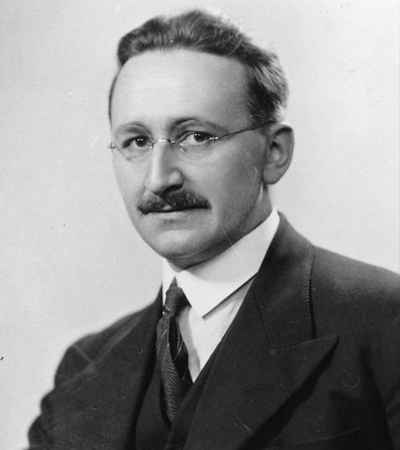
Biography
Friedrich Augustus von Hayek (May 8, 1899–March 23, 1992) was one of the twentieth century’s most important social thinkers. He wrote seminal works in economics, political philosophy, ethics, legal theory, and even psychology that continue to inform the academic conversation within the fields to this day. He is primarily remembered for his works of economic theory, for which he won the 1974 Nobel Prize, and as one of the great advocates for classical liberalism.
Hayek was born in Vienna into an aristocratic family. In 1919, however, titles of nobility were abolished in Austria, and Hayek’s legal name changed from “Friedrich von Hayek” to “Friedrich Hayek.” He served in the Austro-Hungarian army during the First World War, during which he was wounded and decorated for bravery. After the war, Hayek decided to pursue an academic career, driven to explore the ways societies could avoid such destructive conflicts in the future.
He earned doctorates in law and political science from the University of Vienna in 1921 and 1923, and he also studied economics, philosophy, and psychology. It was at the University of Vienna that he first encountered the works of Carl Menger, the founder of the Austrian school of economics. Initially sympathetic to social democracy, Hayek’s political-economic outlook shifted toward classical liberalism after reading Ludwig von Mises’s treatise, Socialism, which detailed the reasons why private property in the means of production was a necessary condition for economic efficiency. Although Hayek was never formally his student, Mises became one of the greatest influences in Hayek’s ongoing research program in technical economics.
In 1931, Hayek joined the faculty of the London School of Economics. It was during this time he became recognized as one of the world’s foremost economic theorists. His work on the market process, coordination, and the informational role of prices greatly influenced the development of microeconomics and is still the locus of lively scholarly debate. During this time, Hayek studied with and influenced a number of economists who themselves would go onto illustrious careers, such as Arthur Lewis, Ronald Coase, Abba Lerner, and Oskar Lange. He remained in Britain after becoming a British subject in 1938, refusing to return to Austria after the Anschluss.
Between 1940 and 1943, Hayek wrote what was perhaps his most well-known work, The Road to Serfdom, where he argued that political freedom and economic control (socialism) were incompatible. The book was immensely popular in Great Britain. When published in the United States by the University of Chicago Press in 1945, it achieved even greater popularity. Reader’s Digest published an abridged version in April 1945, allowing Hayek’s argument to reach a wider audience and propelling him to international fame. However, the book displeased many of his colleagues in the academy, who saw the work as an apology for an outdated and unjust political-economic system.
Beginning in the 1930s, Hayek became engaged in a debate with his friend and intellectual rival, John Maynard Keynes, that would shape the future of macroeconomics. In response to the Great Depression, Keynes advocated for government stimulus programs to fight unemployment and falling income. Hayek instead recommended restraint, although he was not an advocate of “do-nothing liquidationism,” for which he is often incorrectly criticized. Nevertheless, the economic theory behind Hayek’s recommendations lost to Keynes’s aggregative approach to dealing with the economy “as a whole.” By the mid-1940s, despite pushback from the previous generation of economists in high positions at prominent universities, the Keynesian Revolution had changed the way economics was practiced from then on.
Hayek left the London School of Economics and Great Britain for the University of Chicago in 1950. While there, he was a professor on the university’s Committee on Social Thought. By this time, Hayek had moved away from economic theory toward political philosophy, undoubtedly due in part to his publicly perceived defeat at the hands of the new Keynesian macroeconomics. In 1960, he published The Constitution of Liberty, perhaps his most well-known and well-received work on political philosophy in academic circles.
Hayek spent 1962 to 1968 at the University of Freiburg, where he began work on his next work on political philosophy and legal theory, Law, Legislation, and Liberty. After his retirement, he spent a year as a visiting professor at the University of California, Los Angeles, where he continued working on Law, Legislation, and Liberty. From here, Hayek moved to the University of Salzburg in 1969, staying until 1977, although Hayek was unhappy with his time there.
In 1974, an event propelled Hayek back to the attention of academic economists: He was awarded (along with Swedish economist Gunnar Myrdal) the Nobel Prize in Economics “for their pioneering work in the theory of money and economic fluctuations and for their penetrating analysis of the interdependence of economic, social and institutional phenomena.” Hayek and Myrdal, it should be noted, by no means worked together. They were economists of vastly differing viewpoints. Hayek’s award directly contributed to the “Austrian revival,” a restoration of Austrian economics as an ongoing research program in academic economics.
Hayek passed away in Freiburg, Germany, in 1992, and is buried in Vienna. Modern work on information economics, business cycle theory, political philosophy, and legal theory continues to be influenced by his writings. His ideas in their own right and their implications are the source of several living research projects in the social sciences, and his arguments in favor of a free society with a robust market economy are an essential feature of the classical liberal canon.
